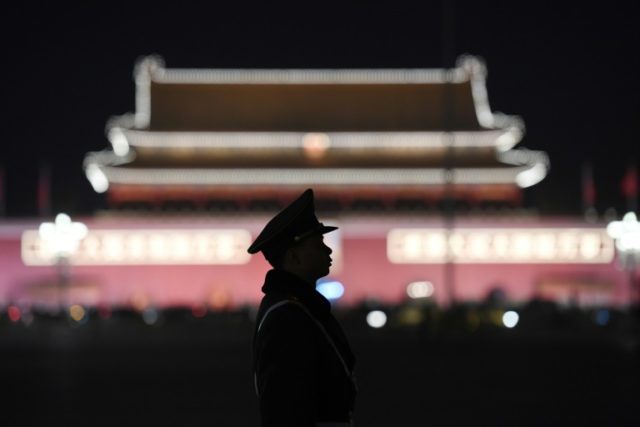The Beijing Fengrui law firm, once home to nearly 100 lawyers and some of the most sophisticated legal representation for human rights activists and enemies of the state in China, has “ceased to exist” after years of government crackdowns, Radio Free Asia (RFA) reported Tuesday.
Chinese Communist Party authorities violently raided the Beijing Fengrui law firm’s headquarters in 2015 and have since sentenced its top attorneys to extended prison sentences for representing defendants accused of opposing communism or promoting alternative ways of thinking, like members of the Falun Gong spiritual movement and famed dissidents Chen Guangcheng and Ai Weiwei. The attorneys represented defendants like human rights activists and religious minorities against the regime.
RFA revealed this week, through remarks from former Fengrui partner Liu Xiaoyuan, that the Communist Party had stripped the firm of its legal license. Most of the attorneys working for Fengrui have also lost their licenses, either after facing charges of anti-government activity or through idleness – attorneys can only go six months without working for a firm until they lose their licenses.
“Now that the license to practice has been revoked, Fengrui law firm has completely ceased to exist,” Liu told RFA. “It is unable to carry out any activities related to [legal] practice.”
The situation has left its attorneys largely with no hopes of finding new work, as the government has branded them dangerous individuals. Liu tells RFA that “according to the regulations on the management of lawyers, I should be able to transfer now that Fengrui no longer exists,” but he expects that to be impossible. “I don’t know whether another law firm might reject me because of background resistance from the relevant departments. That’s always a possibility, and I’m not very optimistic,” he lamented.
A representative for the China Human Rights Lawyers Concern Group told the news outlet that the attorneys not directly implicated in alleged crimes have also lost their licenses because “if a lawyer hasn’t joined a law firm in six months, their license will be revoked, so if the authorities suppress an entire law firm, they are also suppressing the individual lawyers.”
The Communist Party has always frowned upon human rights advocacy, but current Party leader Xi Jinping has significantly escalated persecution against human rights attorneys in particular. In 2015, Xi’s regime launched a raid against Beijing Fengrui Law Firm in particular for allegedly running a “criminal syndicate” against the government. The year saw the arrest of at least 190 human rights lawyers, according to reports at the time, for defending individuals considered antagonistic towards communism. At the time, the state newspaper Global Times accused human rights lawyers of supporting “mob rule” and warned attorneys to stay away from “rabble-rousing.”
The founder of Beijing Fengrui, Zhou Shifeng, was among those arrested. In 2016, a Chinese court sentenced Zhou to seven years in prison for “subverting state power.” Among his specific acts against the state were comments meant to “attack the socialist system, the fundamental policy of one country, two systems, and to incite confrontation against state power.”
In 2016, the Chinese government instituted new regulations on the practice of law that banned human rights attorneys from discussing cases with media or pressuring the government to abide by international human rights norms in any way, according to RFA. This has created a chilling effect in speech on the part of human rights attorneys, not just because of their new limitations in their craft, but because many of the most outspoken attorneys were already imprisoned. The “Administrative Measures for Law Firms” remain in effect today.
Since Zhou’s arrest, not all attorneys have ended up in prison. In one notably gruesome case, attorney Li Baiguang, who spent much of his career criticizing the communist regime, died in February after visiting a hospital with a mild stomach ache. Authorities claimed he had suffered sudden kidney failure, despite no medical history of kidney problems and no evidence provided of his final hours.
Chinese state media has continued to defend its crackdown on the attorneys and attack voices supporting human rights around the world.
“China’s courts work in accordance with Chinese laws. But what the West is doing is assisting those involved in criminal activity in challenging China’s legal system and weakening China’s judiciary independence,” the Global Times claimed in a December 2017 editorial, accusing international human rights groups of “interference with another country’s internal affairs.”

COMMENTS
Please let us know if you're having issues with commenting.